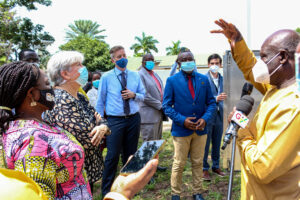EPA, US Embassy inaugurate three Air Quality Monitoring stations in Accra
 The Environmental Protection Agency (EPA), in partnership with the American Embassy, Thursday inaugurated three Air Quality Monitoring stations in Accra, expected to generate real-time accurate data for public awareness creation and policy formulation.
The Environmental Protection Agency (EPA), in partnership with the American Embassy, Thursday inaugurated three Air Quality Monitoring stations in Accra, expected to generate real-time accurate data for public awareness creation and policy formulation.
Two out of the three state-of–the art air quality monitoring stations were established by the Ministry of Environment, Science, Technology and Innovation (MESTI) under the World Bank Pollution Management and Environmental Health Programme (PMEH) at the University of Ghana Campus and the Adabraka St Joseph Roman Catholic Basic School compound.
The last one was established by the American Embassy at its Chancery in Accra.
Dr Henry Kokofu, the Executive Director, EPA, said since 1997, the Agency had been partnering various institutions and other development partners in the management of the environment under various programmes, all geared towards making it safe for the people.
These activities, carried out country-wide, were to ensure air and water quality, enhance industrial effluent quality monitoring, and noise assessment.
There were also Ambient Air Quality monitoring stations set up in Accra, Tema, Kumasi, Takoradi and Tarkwa to monitor sulphur dioxide, carbon monoxide, black smoke, particulate matter (PM10) and Total particulate matter (TSP).
The EPA again partnered the USEPA, UNEP and USAID in July 2004 to expand the scope of air quality monitoring in Ghana, while between 2014 and 2019, the country become one of two cities in Africa to benefit from air quality monitoring and Mega-City capacity building.
That project was based on the successful phased-out lead in gasoline and political stability of the country.
Dr Kokofu said the Agency also appreciated its local partners including the University of Ghana, Ghana Meteorological Agency, DVLA, Ghana Health Service, Friends of the Earth Ghana, Accra Metropolitan Assembly, and Ghana Atomic Energy Commissions, who had helped the EPA to achieve great success in air pollution management.
“With all these achievements, the Agency will continue to expand the air quality networks to the regional capitals and ensure that real-time data air quality is generated country-wide for environmental and public health protection,” he said.
However, Dr Kokofu described Ambient (outdoor) and household (indoor) air pollution as currently the most significant environmental contributors to premature deaths in Africa, outpacing that of malaria and HIV.
The situation in Ghana, he said, was dire and must not be taken for granted at all, as 100 per cent of the entire population (both in urban and rural areas) was exposed to particulate matter concentrations levels exceeding the WHO guidelines.
Again, the World Bank said the cost of air pollution in Ghana’s two largest cities, Accra and Kumasi, is estimated at $264 million per year.
“There is, therefore, the urgent need to control the current state of air pollution, related illnesses and deaths,” Dr Kokofu said.
Madam Stephanie S. Sullivan, the US Ambassador, said the Embassy decided to partner the EPA to establish the monitoring stations to provide cleaner environment for all people living in the capital and beyond.
“The increasing global trend of urbanisation as we see in the Greater Accra Region and many U.S. cities continues to create greater concentrations in air pollutants, with detrimental health effects,” she said.
Madam Sullivan expressed optimism that the monitoring stations would help scientists, researchers, government officials and the public to understand the data in real time “as we work together to identify and mitigate sources of harmful air pollution.
Mr Emmanuel Appoh, the Local Focal Person and the WHO Temporary Advisor on Air Quality Guideline Development, said with combined efforts Ghana had been able to reduce the pollution levels from 78 particulate matter to 44 over a 15-year period.
He, however, said: “We have to work harder to get to the 35 under target three and then 25 under target two of the WHO requirement.”
Professor Sandow Mark Yidana, the Dean, School of Physical and Mathematical Sciences, University of Ghana, expressed the University’s readiness to help monitor and research into air pollution and other environmental issues and find solutions to address the challenges.
Source: GNA
